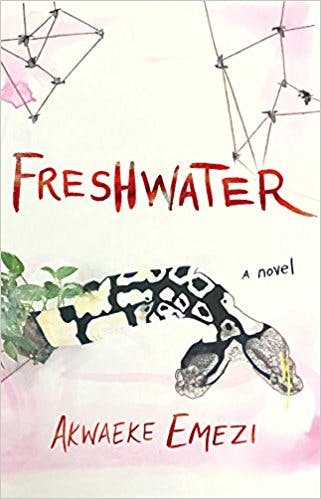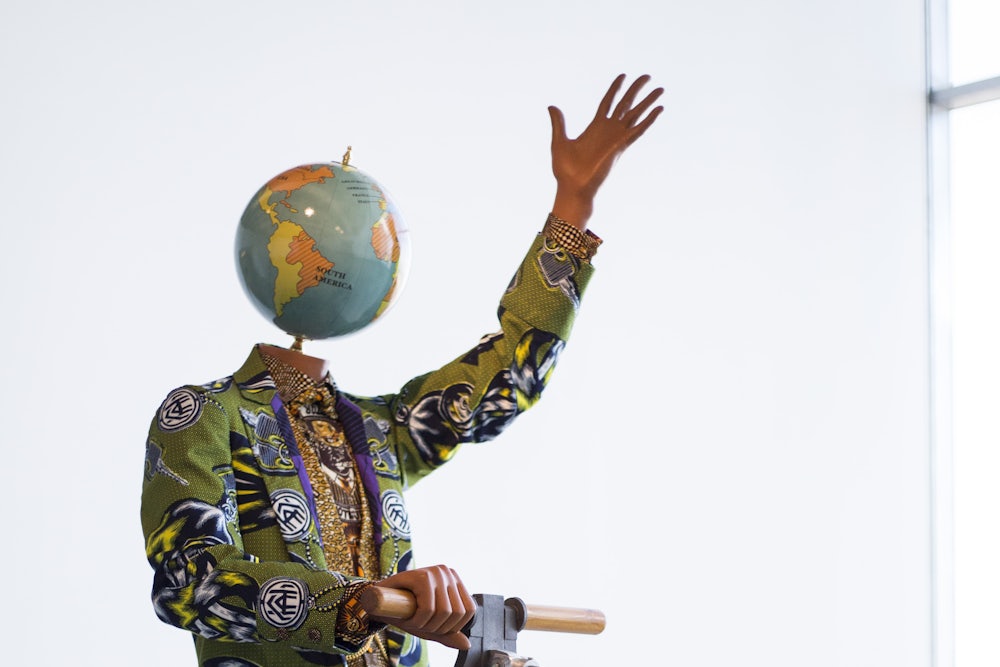Akwaeke Emezi’s Freshwater is a new kind of bildungsroman. Consider the opening sentences of David Copperfield, the most perfect of the form’s first wave. “Whether I shall turn out to be the hero of my own life,” our narrator starts, “or whether that station will be held by anybody else, these pages must show. You’ll find us rough, sir, but you’ll find us ready.” Dickens’s genius here is in establishing the voice of the narrator as one thing, the “hero” as another, and the reader as a third point. In the middle of that triangle, “these pages” sit, a little island of words whose relation to the triad is, at first, beguilingly unclear.
Emezi does something different in her novel, which is probably better called a work of autofiction (it closely mirrors her own life). “The first time our mother came for us, we screamed,” it begins. “We were three and she was a snake, coiled up on the tile in the bathroom, waiting.” Here we are still reading the story of a life told in the first person, but it is plural—we. Who is this collective voice? Baby snakes? And do baby snakes scream?

It’s a brilliant beginning, in the tradition of the classical bildungsroman but extending the form into something more capacious, as if Emezi were pushing with all her might against the walls of a small room and succeeding in making it larger. The “we” of that opening is the heroine, Ada, but the voice is not of her body. Instead, Ada is a plural entity, a being with a human form but also containing multiple “hatchlings, godlings, ọgbanje.”
The ọgbanje will be familiar to readers of Chinua Achebe’s Things Fall Apart, and of course to those close to or acquainted with the spirituality of Nigeria’s Igbo people. In Achebe’s novel, the character Ezinma is ọgbanje. In English the word is often rendered as “changeling,” but it more literally means a child who comes and goes: The ọgbanje is a spirit who would enter a child who would then die, only to return in the next child, and hence continue to torment the mother of the family. The ọgbanje are associated with mutilation of the flesh, since cutting the body of a dead child has been thought to prevent its return.
Things Fall Apart is often taught as a kind of repository of knowledge about Nigeria and British colonialism. This approach does a great disservice to Achebe, as it subjects his works to an anthropological type of reading, separating it from the canon as white readers know it. It empties Achebe’s novels out like a bag, arranging the contents in a cabinet of curiosities. What Emezi does in Freshwater is to make ọgbanje a spiritual reality, a part of our world as familiar, ultimately, as a coming-of-age story.
When Ada was born to her human mother in Nigeria, she seemed to be “a fat baby with thick, wet black hair.” But “there we were, infants in this world, blind and hungry, partly clinging to her flesh and the rest of us trailing behind in streams, through the open gates.” The mother of these infants is Ala, the python. Through the gates that separate the world of the “brothersister” godlings from the human world, some stray children of Ala embedded deep in Ada’s bones and blood. The ọgbanje cannot go back, not while Ada lives. “Not that this mattered,” we learn early. “[It] was clear that she (the baby) was going to go mad.”
As Ada grows, different voices tell different parts of her story, fracturing the reader’s notion of what her identity might be. She herself speaks sometimes, but raggedly (“I don’t even have the mouth to tell this story. ... Besides, whatever they say will be the truest version of it, since they are the truest version of me”). Much of the book is narrated by a godling called Asụghara, who swoops in to save Ada when she experiences trauma. This being cares deeply for Ada but hates all other people. Asụghara is hard, contemptuous, erotic. “The first thing I did was step forward so I could see through her eyes,” Asụghara says. This being hurts people, against Ada’s will sometimes, and comes into conflict with Ada’s Christian faith.
When Ada goes to the U.S. to study, the ọgbanje are angry to be taken far from their home. While the ọgbanje live in Nigeria, they possess a kind of textural (“cultural” wouldn’t be right, because they are not human) consonance with the plants and people and places around Ada. In America their Igbo-ness is pronounced. They speak in the prosody of Nigerian-English, mixed with untranslated phrases.
One day Asụghara is standing at Ada’s eyes when a being with “grass at the wrists and ankles” and “carved teeth” scuttles into the space which is Ada’s interior. “Who the fuck are you?” Asụghara asks. “The thing laughed, like rattling fingers. Eh henh, it said. We knew you would forget, nwanna anyị.” The thing wants to take them all back to the place they lived before they were trapped in Ada’s form.
Freshwater reimagines the genre of psychological self-portrait. Ada suffers the slings and arrows of mental torture more than the average protagonist. She finds a kind of peace, however, in identifying her conflicting and compartmentalized selfhoods as ọgbanje, and in her transition towards a nonbinary gender existence. The ọgbanje are so useful precisely because they offer an alternative to metaphor, an alternative to literary device—they bring the marvelous and the near-imaginary to the realm of autofiction.
The execution and style of the book are so very accomplished that one cannot help but wish for a more ambitious ending, a foray into the fantastical. Instead, the book stays strictly with Ada, never leaving the confines of her life. Whether that means Ada is the hero of her own life, or whether that station is held by the spirits inside her, these pages show.
